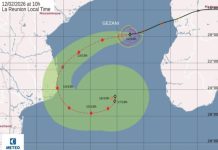Africa-Press – Mozambique. The Mozambique Tuna Company (Ematum) was never a viable concern, one of its senior managers, Cristina Matavel, told the Maputo City Court on Friday.
The court is in the 44th day of the trial of 19 people on charges concerning the “hidden debts” run up by Ematum and two other fraudulent companies, Proindicus and MAM (Mozambique Asset Management).
Matavel had worked at IGEPE (Institute for the Management of State Holdings) which owned 34 per cent of the Ematum shares. She was sent to Ematum in August 2013 as the company’s financial director and later its chief executive officer.
Ematum’s sole contractor, the Abu Dhabi based group Privinvest, sold the company 24 fishing boats – 21 longliners to catch tuna, and three trawlers to catch the squid which should have baited the hooks on the long lines.
When in mid-2014, Matavel found that the first of the Privinvest bats was due to arrive in July, “nothing was ready for them. No crews had been trained for the boats and we had to train them ourselves”.
Mozambique had no fishermen specialized in long line tuna catching, and so seven foreigners (three from Indonesia, two from Uruguay, one from Madagascar and one from the United States) were hired to captain the boats and train Mozambican crew members.
Worse still, when the boats were presented to the regulatory body, the National Maritime Institute (INAMAR), it said they needed substantial modifications before they could go out fishing. The lifeboats they were carrying were inappropriate and had to be replaced. Internal staircases had to be installed, and the number of beds increased for crews of 13.
Ematum alerted Privinvest to these problem, and urged that the boats still under construction at the Privinvest shipyard in Cherbourg, France, should be modified before they were dispatched to Mozambique.
“They never replied to our complaints”, Matavel recalled. “They refused to modify the boats, so the ones that arrived later had exactly the same problems as the initial batch”. “
The three trawlers, she said, were never used. Nobody had investigated whether the bait for tuna is readily available in Mozambican waters – and it isn’t. The type of squid needed as bait had to be imported from Europe.
Small bony fish known in Mozambique as “carapau” will also serve as tuna bait. But carapau, known in English as scad or jacks, come in a wide variety of species, and the type that tuna like to eat are found off the Namibian coast, but not off Mozambique.
Rather than send the trawlers round the Cape to Namibia, the Ematum management tried to hire them out. But nobody was interested in renting them, said Matavel. So the trawlers have been at anchor in the Maputo fishing port for the last six years.
When she raised the problem of bait, the Ematum chairperson, Antonio do Rosario, who is one of the main defendants in the current trial told her to consult the viability study. But where was this study? He told her to look it up on the Internet. “I did so, and found nothing”, said Matavel,
Insurance for the boats was much more expensive than initially imagined. The Mozambican insurance company Emose charged 44,000 dollars per quarter for each of the boats. Insurance costs were thus over 4.2 million dollars a year.
Matavel explained that the insurance is calculated in line with the value of the boats. Privinvest had grossly overpriced its boats at over 22.3 million dollars each, which was the sole factor Emose took into account when calculating premiums.
Ematum has long since stopped paying insurance. All its boats are now lying at anchor entirely uninsured.
The boats must also pay mooring fees of 258 dollars per boat per day. Initially, it was assumed that this would not mount up to much because the boats would be on the high seas for most of the time. In fact, since 2016, the Ematum boats have spent most of their time moored in Maputo.
But, from December 2014 to the end of 2015, at least some of the Ematum fleet put out to sea 66 times. The area covered was the southern Mozambique Channel, from the Bazaruto Archipelago, off the coast of Inhambane province to Ponta de Ouro, on the border with South Africa.
There was not much to show for these trips. Matavel said just 284 tonnes of tuna was caught (an average of just 4.3 tonnes per fishing expedition). 49 tonnes was consumed in Mozambique, and the rest was exported, mostly to Spain and to China.
The total income earned from the exports was 54,000 dollars and 390,000 euros – about 447,000 dollars. This was a derisory amount, given Ematum’s huge costs.
The theoretical Ematum capacity was 30 tonnes for each longliner. If all the boats were at sea at once, that would be a capacity of 630 tonnes.
The whole operation was back to front, Matavel said. The boats should only have been acquired once the company had solved all its other problems, such as training the crews, preparing onshore freezing and processing facilities, and working out where the bait would come from. By ignoring logical procedures, the management guaranteed that Ematum would be “still-born”.
Matavel said she had also tried, without success, to restructure the Ematum debt. Ematum had taken a loan of 850,000 dollars from Credit Suisse, at high interest rates and with only a seven year repayment period.
But when she embarked on restructuring the debt, she immediately received a protest from the Russian bank VTB. For Credit Suisse had syndicated the loan, passing a large amount of it on to VTB. This was a piece of information that Rosario had concealed from the rest of the Ematum management.
“I wasn’t aware that the loan had been syndicated”, said Matavel. “I contacted Rosario and demanded to know the truth. He became very angry with me”.
The restructuring was taken over by the Ministry of Economy and Finance, with disastrous results. The Ematum bonds issued in 2013 were replaced in 2016 by sovereign government bonds with a longer repayment time, but at a higher interest rate, a deal agreed between the government and Credit Suisse and VTB. What the government did not know at the time was that the Credit Suisse bankers involved in the negotiations had been taking large bribes from Privinvest.
The deal was signed just before the other two loans, to Proindicus and MAM, became public knowledge, and the whole “hidden debts” edifice began to crumble round the government’s ears.
Subsequently, the ex-Ematum bondholders have held further negotiations with the government with the result that Mozambique is likely to continue paying interest and capital on this entirely illicit loan until 2031.
Matavel denied any knowledge of a defence and security component to Ematum. Testifying to the court on Thursday, the former IGEPE chairperson, Apolinario Panguene, claimed that on the one occasion he visited the Ematum headquarters, Matavel refused to allow him into the basement, because security equipment was supposedly kept there.
Matavel categorically denied this claim. “Panguene was my superior”, she said, “How could I possibly deny him access? And the Ematum building had no basement”.
Asked why she had left Ematum in January 2016, Matavel replied “Perhaps I’ll find out at the end of this trial”.
For More News And Analysis About Mozambique Follow Africa-Press






